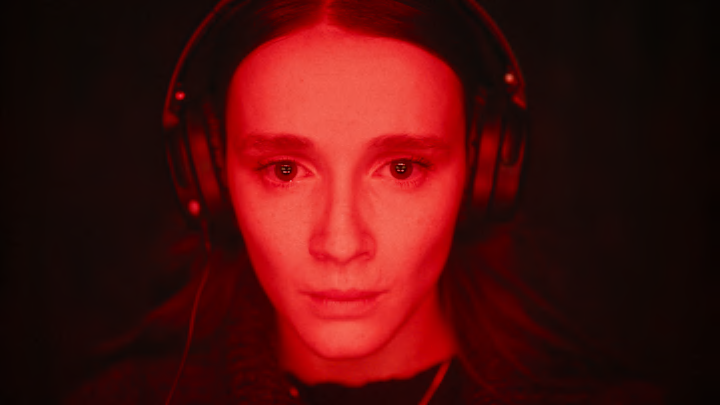Red Rooms is both a harrowing condemnation of our culture's obsession with glorifying horrific killers and obsessing over them as if they were heroes of folklore rather than deeply twisted individuals and dissection of terminally online culture, the culture that makes these stories and murderers so accessible to the average person.
At the center of the film is Kelly-Anne (Juliette Gariépy), a disturbed young woman who finds herself drawn to the high-profile murder trial involving Ludovic Chevalier (Maxwell McCabe-Lokos). Chevalier has been accused of brutally murdering and torturing three little girls, with the primary evidence coming from video footage of him torturing his victims in the prolific "red rooms" rumored to exist deep in the dark web. Chevalier would make snuff videos of his victims and then sell them online to the highest bidders. In at least one video, prosecutors claim you can recognize the accused from the eyes of his mask.
But the story of Red Rooms really isn't about Chevalier at all. It's a character-driven piece that fixates on its two female characters. Kelly-Anne shows sociopathic tendencies in her dogged determination to hunt down the third missing video and her voyeuristic tendencies toward the case, to the point where she camps outside in an alley near the courtroom just to ensure she can get inside at the start of the trial each day.

She's become entirely and wholly consumed by this story, and one has to ask why? Is it fascinating to her to imagine these crimes being enacted? Does she get a rush from the idea of becoming a victim framed in this kind of morbid and horrendous infamy? In contrast to Kelly-Anne's character is another voyeur named Clementine (Laurie Babin), who feels a little more like the traditional "groupie" that has existed throughout time. The women who fawned over men like Ted Bundy and Jeffrey Dahmer, even sending them fan mail in jail.
Clementine really believes that Chevalier is innocent and finds herself drawn to him with her insistence that the prosecution is wrong. It becomes a moral crisis for her to protest this case and everything it entails. But it's only by really exploring the relationship between Clementine and Kelly-Anne that we can see the stark differences between them and how Kelly-Anne's obsession is genuinely on an entirely different level, something Clementine couldn't even fathom.
What really makes Red Rooms shine is director Pascal Plante's precise direction and smooth build of tension. Plante's purposeful framing and artistic shots create an ever-growing sense of unease comparable to David Fincher's ability to craft a compellingly tense psychological thriller.
Plante also utilizes careful art direction in depicting the dark web and moments where audiences are privy to Kelly-Anne's computer set-up to bring us into her warped world and understand just how deeply woven into its sinister fabric she really is. All without showing any gore, though don't let that mislead you into thinking Red Rooms isn't disturbing. You don't need visuals to feel horrified. Plante understands that and gives just enough to allow your brain to do the rest to chilling effect.

And then there's Gariépy, the actress playing Kelly-Anne, another standout in a film loaded with pitch-perfect performances. Her quiet intensity lends itself perfectly to the story being told. She excels at conveying her thoughts through the most minuscule expressions. It works well to complement Clementine's slightly warmer and almost naive energy, which is why the final act becomes so dark and tense compared to the rest of the film, due to a sudden stark shift in their relationship.
All in all, Red Rooms is a film that leaves a scorching impact and will make any viewer firmly reassess the often exploitative relationship with all things true crime and how they consume it. Brilliant and searing, Red Rooms sinks into your brain and makes a home there.
